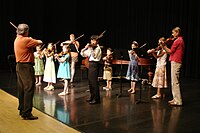
Photo from wikipedia
Evaluative performances, such as conservatory examinations and competitions, frequently play a significant role in piano instruction in many parts of the world. Many students participate in these performances as a… Click to show full abstract
Evaluative performances, such as conservatory examinations and competitions, frequently play a significant role in piano instruction in many parts of the world. Many students participate in these performances as a result of the perception that a program of instruction that is focused on standardized curriculum and evaluation practices will be of higher quality and will result in higher levels of student motivation. This study employs grounded theory methodology and narrative inquiry to better understand the experiences of beginning and intermediate piano students. The findings consist of characteristics of positive experiences with evaluative performances as well as factors that contribute to the quality of students’ experiences. Students who had positive experiences with evaluative performances reported positive emotional responses, perceptions of meaningful music learning, and strengthened musical identity. In order for students to have positive experiences with evaluative performances, their understandings, values, goals, and characteristics as a performer needed to align with the demands of the evaluation. In addition, positive experiences with evaluative performances required the presence of supportive relationships with parents and teachers. This article concludes with pedagogical implications.
Journal Title: International Journal of Music Education
Year Published: 2017
Link to full text (if available)
Share on Social Media: Sign Up to like & get
recommendations!